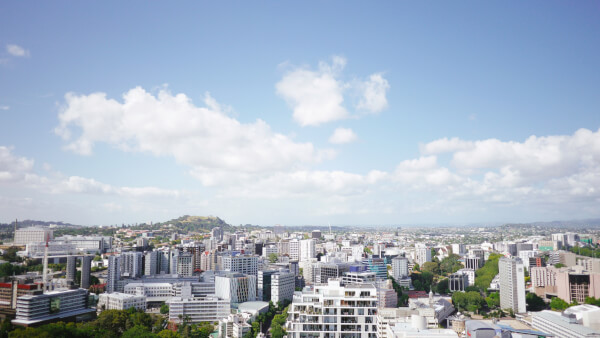Property taxes in Cyprus: Full guide for Americans
Want to learn about property taxes in Cyprus? This guide covers types of property taxes and how they are calculated to help you navigate the process.

If you're planning to rent in New Zealand, one of the first things you'll notice is that it works a bit differently than in other countries.
The most obvious difference is that you'll typically need to pay rent weekly rather than monthly. So when you see a rental listing advertising "500 NZD per week," you'll need to multiply that by ~4 to get your approximate monthly rent.
Renting in New Zealand isn't cheap, but rental prices and amenities are generally comparable to what you'd find in the US. Like anywhere else, living in big cities like Wellington comes with higher prices. Let’s dive in.
You can rent in New Zealand as long as you have legal standing in the country.
This typically means having either a temporary visa (for work, study or business) or a permanent residence visa if you're planning to stay long-term. Eventually, you may be able to get citizenship in New Zealand, too.
It's usually hard to find a property for rent before arriving in New Zealand. Landlords and property managers want to meet potential tenants in person, and you'll want to see the property yourself before committing to anything, too.
So, consider booking temporary accommodations like a hotel or an Airbnb for your first few weeks while you search for the right long-term home. If you're heading to a major city like Auckland or Wellington, be prepared for a potentially lengthy search because the market is competitive.
New Zealand has a relatively high cost of living, and this affects rental prices. That said, what you'll pay largely depends on where you choose to live and how close you want to be to city centers, so you can save money by renting in more rural areas.
On average, you're looking at about 1,088 USD per month for a 1-bedroom apartment in a central location. If you live further away from the center, average prices drop to 898 USD for a 1-bedroom.¹
Here's a look at the average rent in New Zealand's major cities.
| City | 1-bedroom (city center) | 3-bedroom (city center) |
|---|---|---|
| Wellington² | 1,452 USD | 2,483 USD |
| Auckland³ | 1,234 USD | 2,314 USD |
| Queenstown⁴ | 1,368 USD | 2,702 USD |
| Christchurch⁵ | 1,298 USD | 1,942 USD |
| Dunedin⁶ | 843 USD | 1,501 USD |
| 🔍 Wondering how much that would cost in New Zealand dollar (NZD)? Check out this handy conversion calculator: |
|---|
Wellington is the most expensive city for renters, especially for smaller apartments. Queenstown comes with the highest prices for larger homes, while Dunedin has the most affordable rentals on this list.
Most landlords require a deposit, called a "bond" in New Zealand. As long as you leave the property in good condition, you'll get your bond back. Sometimes, landlords can also ask for either 1 or 2 weeks' rent upfront when you move in.⁷
In addition to rent, you'll also need to pay for your utilities and other services like the Internet every month. Here's what to expect.
| Expense | Average cost |
|---|---|
| Bond | Up to 4 weeks’ rent⁷ |
| Rent in advance | 1-2 weeks' rent⁷ |
| Utilities | 135 USD¹ |
| Internet | 50 USD¹ |
By law, your landlord must lodge your bond with Tenancy Services within 23 days, and you'll receive a confirmation when this happens.⁷ The Tenancy Services will hold onto your money and return it to you when you move out (minus any damages).
New Zealand has strict rules about what landlords can and can't charge tenants. You should never have to pay any letting fees or "key money" (fees for granting you a tenancy), agent fees or application fees.
Landlords also can't ask for more than 4 weeks' bond or more than 2 weeks' rent in advance.⁷
The only exception is the "option fee." If you're not sure about renting a property, the landlord might ask for this fee to hold the property while you decide.
The "option fee" can't be more than 1 week's rent, and the landlord will have to return it to you or put it toward your rent if you decide to rent the property.⁷
You'll typically need to show documents that prove your identity and income to secure your rental. This usually includes:
- Your passport and visa documentation to show your legal right to be in New Zealand
- Financial documents like your recent bank statements and proof of income
- Additional documents like credit history or a brief letter explaining why you'd make a great tenant
- References from previous landlords (sometimes optional)
Organize your documents before you start your property search for a faster application process. Also, you might consider opening a bank account in New Zealand to make it easier to pay rent.

Wise offers you a quick, secure and transparent way of sending money to New Zealand. You get the mid-market exchange rate for your payments and see how much it’s charged for the transfer before sending the money from your bank.
With the Wise Account you can also hold 40+ currencies, spend money in 150+ countries, and receive like a local in 9 different currencies.
Please see Terms of Use for your region or visit Wise Fees & Pricing for the most up to date pricing and fee information
Apartments in New Zealand are common in bigger cities like Auckland and Wellington, and many come with popular amenities and modern security features.
You can also find older, more "character" apartments, but make sure that they have good insulation before moving in.
There are plenty of standalone houses for rent in New Zealand. You'll typically have a garden or backyard, which is perfect if you have kids or pets.
Houses are typically more expensive than apartments in New Zealand, but it ultimately depends on your location.
"Flatting" is what New Zealanders call sharing a house with others. Your housemates (or "flatties") might be friends, coworkers or strangers looking to share costs.
Many students and young professionals rent like this because it's usually the most affordable option.
Renting in New Zealand is typically done through private landlords (or their property managers) and you can find many listings online. If you're looking for something specific, you may also consider working with a real estate agent, but that's not very common.
You'll likely rent from the property owner directly or communicate with their property manager.
Some renters prefer dealing with the owner directly, but property managers are more likely to follow rental laws to the letter. On the other hand, landlords often value long-term tenants and might be more flexible about pets or rent increases. Don't automatically dismiss either option!
Most people find houses or apartments in New Zealand online. The best place to start is often Trade Me, but you can also try:
Once you see a listing you like, get in touch with the person responsible for it and ask to schedule a viewing.
You can also use Facebook groups, but be aware of scams since virtually anyone can post in these groups.
Real estate agents can help you find rentals, especially if you're looking for something very specific or a higher-end property. They know the local market and can sometimes give you access to new listings.
But it's more common to find property listings online and work directly with the owner or property manager.
New Zealand is generally safe, but it's important to take basic precautions during your property search just like in any other country.
Never send money before seeing a property in person and always get a proper tenancy agreement in writing.
It's important to ask the right questions when comparing properties to rent in New Zealand. Here are the most important things to consider:
Total costs: Confirm the weekly rent and ask about water rates (some properties charge separately) and any maintenance services like lawn care
Heating system: Check that the property has proper insulation and heating because it'll impact your utility bills, especially in the winter months
Bathroom and kitchen ventilation: New Zealand's climate can make homes prone to dampness
Pet policy: Even if you don't have pets now, it's helpful to know if the property allows them in case you change your mind in the future
Point of contact: Find out whether you'll be communicating with the owner directly or with a property manager and who to reach out to for maintenance issues or if you have any questions
Lease term: Some landlords are looking to rent long-term, but others may only have the property available for a year or two, so it's important to find a landlord who's aligned with your plans
Neighborhood: Ask about the neighbors, grocery stores and restaurants, noise levels and other location things that are important to you
Make sure to view a few different properties and consider your options, especially if you want to rent long-term. It's not a decision you should rush into!
Here's what to do once you find a property you like.
Step 1. Submit your application
You'll need to fill out the rental application from the landlord or property manager sharing thing like your name, contact information and permission for a credit check. This application doesn't bind you to anything.
Step 2. Get approved
Wait for the landlord's decision. This can take a few days.
Step 3. Sign the tenancy agreement
Make sure to carefully read so you're clear on what your rights and responsibilities are.
Step 4. Make your payment
This typically includes the first month's rent, the bond (up to 4 weeks' rent) and sometimes the advance rent (1-2 weeks). Make sure to receive confirmation that your bond has been lodged with Tenancy Services.
Step 5. Inspect the property
Before you move in, document any existing issues, such as maintenance problems or any furniture damage. This ensures that you're not charged for these issues when you move out.
Sometimes, landlords will ask you to provide a reference on your application. Ideally, it'd be a previous landlord, but if you haven't rented before, you could use an employer or another person who'd be able to speak to your character and reliability.
A tenancy agreement is a detailed contract that sets out the terms of your rental. It protects both you and your landlord because it gives both of you specific rights and responsibilities.
Make sure that your tenancy agreement clearly states the following information:
- Full names of both tenant and landlord
- Rental property address
- When the tenancy will start and end (if it's a fixed-term tenancy)
- Rent amount
- Bond amount
- When and how rent should be paid
- A list of furniture and appliances included in the rental
- Signatures
You'll also need a signed insulation statement and a health home statement to prove that the rental property is complying with all necessary living standards.
Keep in mind that the law still applies even if you don't have a written tenancy agreement. But it's much safer to get everything in writing.
Your tenancy agreement will be either a fixed-term agreement or a periodic agreement.
A fixed-term agreement signs you up for a specific timeframe, such as 12 months. Once you sign, you're committed until the end date unless you and your landlord agree to end the contract early (or you find someone to take over your lease).
A periodic agreement is more flexible. It keeps going until either you or your landlord decides to end it.
If you want to move out, you need to give 28 days' notice (though your landlord might agree to less). Your landlord needs to give you more notice – 90 days, or sometimes 63 days in special cases – and they need a valid reason from the Tenancy Act.⁷
As a tenant, you're responsible for paying rent on time, covering utility costs (like electricity, gas and metered water), and your personal belongings. You'll also need to pay for any damage to the rental property caused by you or your guests.
If you're renting an apartment with other people, keep in mind that all tenants who're on the agreement are responsible for rent, even if one person isn't paying their share.
In turn, your landlord must maintain the property and make sure that it meets the required standards. They can only enter the property with a 48-hour notice, so if your landlord is showing up unannounced - that's illegal.
If you run into a problem with your landlord, you can send them a formal Notice to Remedy (you can find templates on the Tenancy Services website).
If that doesn't work, you can use Tenancy Services' mediation or apply for a Tenancy Tribunal hearing. For flatmate disputes, get in touch with the Disputes Tribunal.
There are many different cities for renters in New Zealand, including:
Renting in New Zealand has some unique differences, such as having to pay rent weekly, but the process is quite straightforward and structured. You should have no issues renting as a foreigner as long as you have your paperwork in order.
Use Wise to connect your money worldwide and pay large payments like your rent like a local. It's fast, simple and secure.
Sources
Sources checked 12.2.2024
*Please see terms of use and product availability for your region or visit Wise fees and pricing for the most up to date pricing and fee information.
This publication is provided for general information purposes and does not constitute legal, tax or other professional advice from Wise Payments Limited or its subsidiaries and its affiliates, and it is not intended as a substitute for obtaining advice from a financial advisor or any other professional.
We make no representations, warranties or guarantees, whether expressed or implied, that the content in the publication is accurate, complete or up to date.

Want to learn about property taxes in Cyprus? This guide covers types of property taxes and how they are calculated to help you navigate the process.

Moving to New Zealand from the US? This guide covers all the essential information for relocating to Finland as an American, including tips and insights.

Is it expensive to live in New Zealand? Find the answer to this and more cost of living in New Zealand questions in this handy article.

Everything you need to know about getting a New Zealand work visa.

A handy guide for understanding the job options in New Zealand for foreigners and expats.

New Zealand is a dream vacation destination for many of us, whether you want to visit its quirky yet culturally rich cities or seek solitude in the country’s...